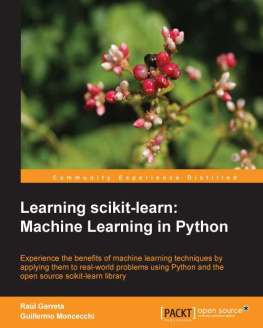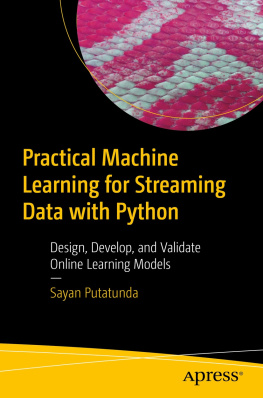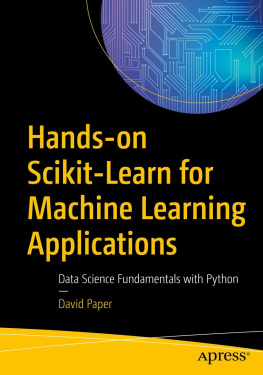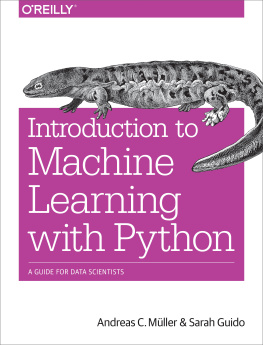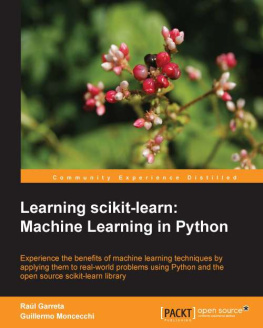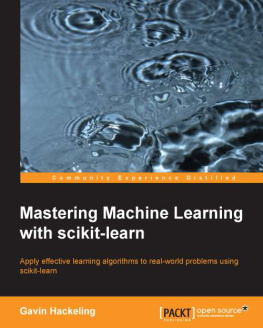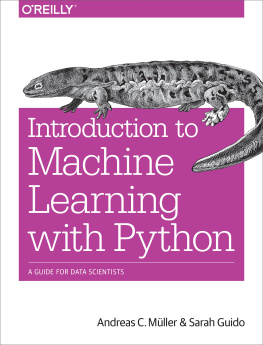Raúl Garreta - Learning scikit-learn: Machine Learning in Python
Here you can read online Raúl Garreta - Learning scikit-learn: Machine Learning in Python full text of the book (entire story) in english for free. Download pdf and epub, get meaning, cover and reviews about this ebook. year: 2013, publisher: Packt Publishing, genre: Home and family. Description of the work, (preface) as well as reviews are available. Best literature library LitArk.com created for fans of good reading and offers a wide selection of genres:
Romance novel
Science fiction
Adventure
Detective
Science
History
Home and family
Prose
Art
Politics
Computer
Non-fiction
Religion
Business
Children
Humor
Choose a favorite category and find really read worthwhile books. Enjoy immersion in the world of imagination, feel the emotions of the characters or learn something new for yourself, make an fascinating discovery.
- Book:Learning scikit-learn: Machine Learning in Python
- Author:
- Publisher:Packt Publishing
- Genre:
- Year:2013
- Rating:4 / 5
- Favourites:Add to favourites
- Your mark:
Learning scikit-learn: Machine Learning in Python: summary, description and annotation
We offer to read an annotation, description, summary or preface (depends on what the author of the book "Learning scikit-learn: Machine Learning in Python" wrote himself). If you haven't found the necessary information about the book — write in the comments, we will try to find it.
Experience the benefits of machine learning techniques by applying them to real-world problems using Python and the open source scikit-learn library
Overview
- Use Python and scikit-learn to create intelligent applications
- Apply regression techniques to predict future behaviour and learn to cluster items in groups by their similarities
- Make use of classification techniques to perform image recognition and document classification
In Detail
Machine learning, the art of creating applications that learn from experience and data, has been around for many years. However, in the era of big data, huge amounts of information is being generated. This makes machine learning an unavoidable source of new data-based approximations for problem solving.
With Learning scikit-learn: Machine Learning in Python, you will learn to incorporate machine learning in your applications. The book combines an introduction to some of the main concepts and methods in machine learning with practical, hands-on examples of real-world problems. Ranging from handwritten digit recognition to document classification, examples are solved step by step using Scikit-learn and Python.
The book starts with a brief introduction to the core concepts of machine learning with a simple example. Then, using real-world applications and advanced features, it takes a deep dive into the various machine learning techniques.
You will learn to evaluate your results and apply advanced techniques for preprocessing data. You will also be able to select the best set of features and the best methods for each problem.
With Learning scikit-learn: Machine Learning in Python you will learn how to use the Python programming language and the scikit-learn library to build applications that learn from experience, applying the main concepts and techniques of machine learning.
What you will learn from this book
- Set up scikit-learn inside your Python environment
- Classify objects (from documents to human faces and flower species) based on some of their features, using a variety of methods from Support Vector Machines to Nave Bayes
- Use Decision Trees to explain the main causes of certain phenomenon such as the Titanic passengers survival
- Predict house prices using regression techniques
- Display and analyse groups in your data using dimensionality reduction
- Make use of different tools to preprocess, extract, and select the learning features
- Select the best parameters for your models using model selection
- Improve the way you build your models using parallelization techniques
Approach
The book adopts a tutorial-based approach to introduce the user to Scikit-learn.
Who this book is written for
If you are a programmer who wants to explore machine learning and data-based methods to build intelligent applications and enhance your programming skills, this the book for you. No previous experience with machine-learning algorithms is required.
Raúl Garreta: author's other books
Who wrote Learning scikit-learn: Machine Learning in Python? Find out the surname, the name of the author of the book and a list of all author's works by series.

